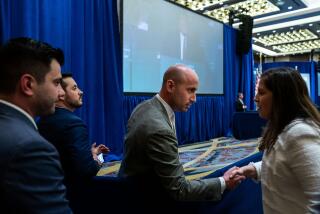Morgan Stanley Payout Questioned
- Share via
Morgan Stanley may be trying to buy the silence of witnesses in a sex bias case, according to federal regulators, who cited a $475,000 settlement the firm reached with a woman who filed a discrimination claim.
In a letter to the judge, a lawyer for the Equal Employment Opportunity Commission said Morgan Stanley might be using monetary settlements to keep women from testifying. The agency, which enforces federal laws against job discrimination, noted a May 12 agreement between Morgan Stanley and an unidentified woman and asked to see whether there were others.
EEOC lawyer Michelle Caiola said her “concern goes beyond this one instance.” In January, the commission “received an anonymous letter claiming that Morgan Stanley has pressured potential claimants into signing releases in return for increased compensation,” Caiola said in her May 26 letter.
A suit on behalf of former Morgan Stanley bond seller Allison Schieffelin is scheduled to begin trial July 7, the first gender-bias case against a Wall Street firm to make it that far.
The EEOC, which filed the suit, said it would call about two dozen women to testify against the securities firm. The agency says Morgan Stanley paid women less and denied them job opportunities.
Caiola’s letter to U.S. District Judge Richard Berman says provisions in the unidentified woman’s settlement with Morgan Stanley will “chill” her cooperation with the agency.
Morgan Stanley spokeswoman Melissa Stonberg declined to comment.
In her letter to Berman, Caiola cited an order issued two years ago by U.S. Magistrate Judge Ronald Ellis, who said women settling bias claims with the firm must remain free to discuss them with the EEOC, according to Caiola.
The firm said it didn’t violate Ellis’ order because the May 12 settlement includes a provision that allows the woman to assist government investigators, Caiola’s letter says.
Caiola said the pact required the woman “to cooperate with and assist Morgan Stanley” in any lawsuit against the firm; to make herself “fully available” to firm lawyers; not to “voluntarily offer assistance or testimony in any action against Morgan Stanley”; and not to disclose the terms of her settlement.
“With her monetary settlement at stake, the claimant may interpret the conflicting provisions” of the settlement agreement “conservatively and, as a result, not testify freely at trial,” Caiola said. “Such a result would harm EEOC’s case.”
Caiola’s letter didn’t say whether the woman was a current or former employee.
The EEOC’s accusation is the latest wrinkle in a case that began when Schieffelin filed a bias complaint with the agency in September 1998. The EEOC sued three years later, saying as many as 400 other women in the firm’s institutional equities division were victims of discrimination. Settlement talks have collapsed.
Schieffelin, 42, who made $1.35 million in 1998, was fired in 2000 after claiming she was passed over for a promotion to managing director.
Morgan Stanley has denied the EEOC’s charge, saying there was no bias and that Schieffelin was fired for initiating “an abusive confrontation with her boss.”
More to Read
Inside the business of entertainment
The Wide Shot brings you news, analysis and insights on everything from streaming wars to production — and what it all means for the future.
You may occasionally receive promotional content from the Los Angeles Times.










